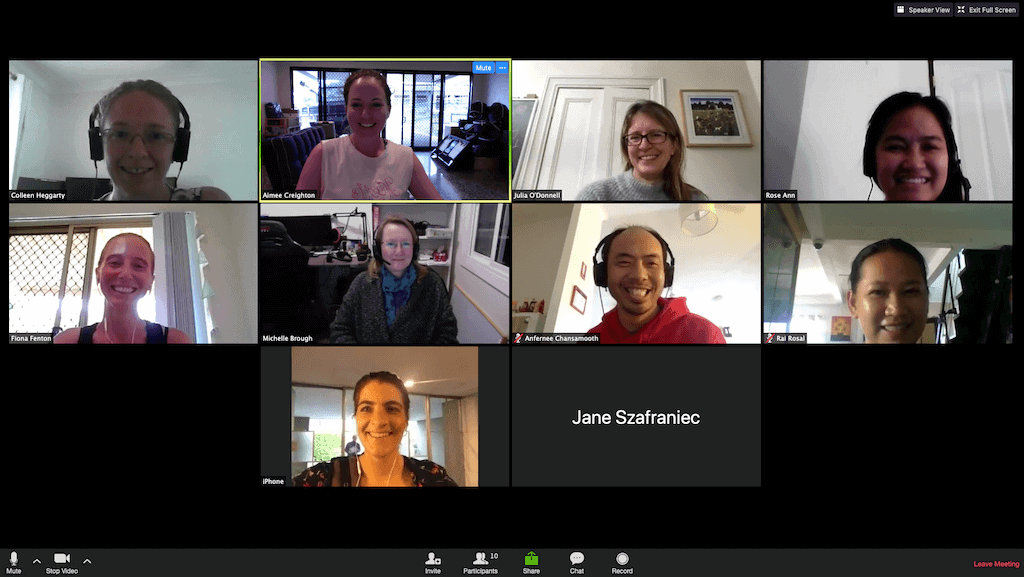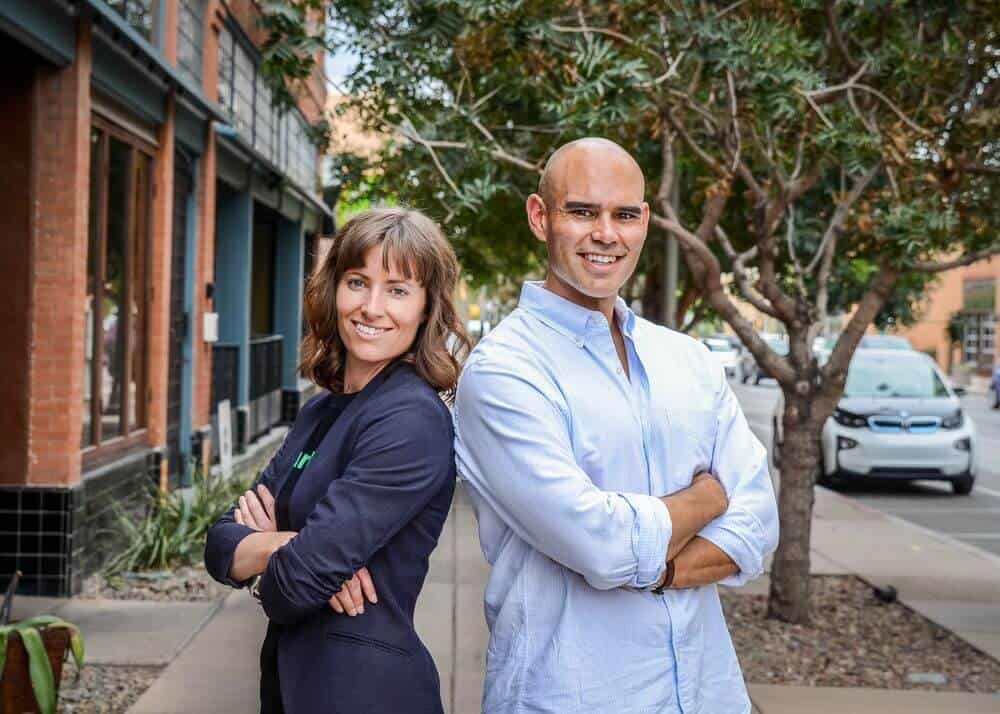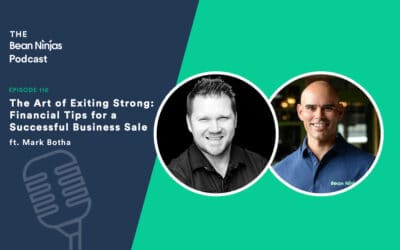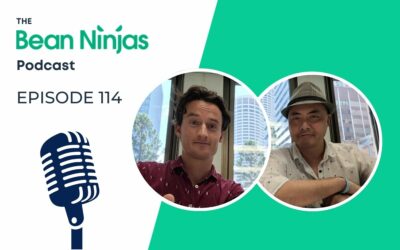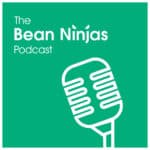
Learn about Wayne Richard and Meryl Johnston’s first year as business partners and what they’ve learned along the way.
In Episode 68 of the Bean Ninjas Podcast, CEO Meryl Johnston talks to Partner Wayne Richard about the lessons learned in the 1st year of running Bean Ninjas together and how they grew as business partners.
Episode Highlights
Want to learn what makes a successful business partnership? Wayne Richard and Meryl Johnston discuss the highs (and the few lows) of their 1st year of running Bean Ninjas together. #business #leadership #partnership Share on X01:00 – Reflecting on Bean Ninjas’ last year’s growth
02:53 – The lessons about leadership Wayne picked up within a year
05:21 – Investing in the strong areas and growing as business partners
06:22 – The power of positive reinforcement
10:30 – The importance of investing in your team
12:16 – Communication preferences and learning styles
13:31 – The importance of team retreats in building a strong business partnership
16:32 – The challenge of restructuring the team
19:33 – Meryl’s recommendation to (small) business owners
Learn the foundations of financial literacy and using Xero with Meryl.
Transcription
Announcer Welcome to the Bean Ninjas podcast where you get an all access pass to see what happens behind the closed doors of a fast growing global bookkeeping and financial reporting business.
Meryl Johnston:
Hi everyone. Welcome back to another episode of the Bean Ninjas podcast. Today I’m chatting with Wayne Richard, my business partner at Bean Ninjas.
We’ve recorded a number of podcast episodes together and today we’re going to be treading through Wayne’s reflections on a year as a partner at Bean Ninjas, and he’s got some interesting insights, and some great takeaways that I think will be relevant to you whether you are running your own business or not. Enjoy.
Hi Wayne. It’s great to be recording another podcast episode with you. How’s everything with you?
Wayne Richard:
Excellent. And I’ll say happy anniversary Meryl.
Meryl Johnston:
Yes, absolutely. It was this time last year, August 2018 where I was over in Arizona visiting you. Oh, actually meeting you face to face for the first time.
Wayne Richard:
That’s right. So much has gone on to in this last year. I’m excited to share a little bit about what we’ve been able to accomplish together.
View this post on InstagramWant to know what growth after 4 years in business is really like? Here’s our 4 year growth report!
Reflecting on last year’s growth
Meryl Johnston:
Something that I do each year at Bean Ninjas is write a reflection on what I’ve learned and also where I see the business headed. And now as a business partner, we’ve come here in this podcast to talk about your one year reflection, and I’m really excited and interested to hear what your thoughts are on the one year that we’ve had.
Wayne Richard:
Absolutely. And it was exciting for me to reflect and spend the time going back through a lot of the experiences that we’ve had, and the company has been through in this last year, and the people that have had an opportunity to meet.
And really it helped me gain some clarity around some of the things that are most important to me and also some of the learnings that I’ve been able to put in my wheel house throughout the past year.
Related: Startup Growth Report: Bean Ninjas 4th Year Review
Meryl Johnston:
Well, let’s jump into it. So how would you sum it up this last year?
Wayne Richard:
Yeah, sure. So I actually came across a great quote from Jack Welch, the CEO of General Electric. And he had said before you become a leader, success is all about growing yourself, after you become a leader, success is about growing others.
And really for me this year was really wrapped up in two big learnings. And the first is really putting yourself first and investing in yourself as a leader, but then also being humble enough to understand those areas where it’s most important to grow others and making that investment in a team.
The lessons about leadership Wayne picked up within a year
Meryl Johnston:
Beautiful. And I love that quote from Jack and the way that you’ve articulated that in your own learnings. So what are some of the things that either you did or that you’ve learned related that first point around putting yourself first and investing in yourself as a leader?
Wayne Richard:
Sure. And to backtrack a little bit, I had been a solopreneur and really managing a small firm on my own with very little assistance. So for me to have an opportunity to then step into a global team with A players that were centered around a number of functions that I lacked skills in, it really brought about my first point, and that’s to focus on always growing.
And we’ve shared in the past, this is a key value that we’ve come together and agreed upon within Bean Ninjas that we hope to live out. And really it was about listening and learning from those with more experience than me.
And some of the ways I was able to do that in this last year was through involvement in masterminds. DC has amazing resources through their events in their community, but also in breakout masterminds that I was able to be a part in contributing and other was in leadership challenges.
Early in the year, I was able to participate in an amazing leadership challenge called Peak Persona, and we’ve talked about it and had Aaron on the podcast before, but it really set a stage for developing key daily habits and then also weekly checkpoints and structuring my time so that I was most effective.
Related: Operating at your Peak Persona – Interview with Aaron Birkby
And another was Russ Perry is a creative syndicate. Outside of that, really is just… Some of the work that you and I have created amongst each other in terms of challenges and daily accountability check-ins, the building of kind of an identification of habits that I’m looking to instill, routines that I’m working within, not just my day, but also my weeks and how we’re structuring larger goals for bigger projects within the organization.
Meryl Johnston:
And you talked about some of these things that I’ve also been learning from and involved in as well, and I’m a big fan of mastermind and Peak Persona was a program that I was involved in a couple of other members of Bean Ninjas and as you said, we’ve had Aaron on the show, and it’s making these investments in yourself and as we’ll talk about later in the podcast, also in other team members that really help people to grow, which ultimately can help businesses to move forward too.
Wayne Richard:
Yeah, absolutely.
The power of positive reinforcement
Meryl Johnston:
So with this, are there some other components of this investing in yourself that you wanted to reflect on or the or that you had some insights on?
Wayne Richard:
Yeah, two more points. Really a big project for me was getting to understand that one person responsible for my shortcomings and being humble to identify that at the end of the day it was me.
And it was learning to accept both criticism, but also on the other end it was often hard for me to recognize and acknowledge praise that was being given and not just accepting it, but really taking value in the other person’s taking the time out of their day to recognize a positive effort or contribution that you were able to make in their lives or within the business.
And lastly, it was really to make the decision to invest, to strengthen those areas, to begin covering where I’ve identified shortcomings within my own skill sets.
Meryl Johnston:
I think that’s really interesting, and it takes a certain kind of person to be able to accept criticism or critiques or feedback, but also then to review it and reflect and actually turn that into an action. And I see people that are successful are the ones that can do that, can take on that feedback and then identify what to improve it and how to improve.
I think it’d be really interesting for our audience if you wanted to dig into that a little bit more. I don’t know if you wanted to share any of the areas that you’re working on or any of the areas that you received praise and then how you thought about that in terms of next steps or actions that you’re taking because I think this is really valuable stuff.
Wayne Richard:
Sure. So one thing I learned throughout this last year that was kind of a result of some accolades, and some praise that I received was really my capabilities within the area of sales. I naturally had never considered myself to be a salesman, but had found that a lot of the strengths that I brought to the team, and a lot of just the base of my personality is really built in things that helped identify me as one of the top players in our company to manage and actually tackle a lot of the sales calls.
So there was one example, and I also feel there’s a lot of power and positivity. I think one thing that was powerful for us as a team to do, and this was based on a blog post that I had come across from Chris Franzia Tran UIL, and that was to share in a Slack channel wins and praises.
I think you can always remember back to your time in a classroom when you may have been dozing off or not paying attention, but the teacher points to someone and says, “Hey Meryl, amazing job. That was a great question. It really shows that you are involved in the lecture and paying attention.”
I know for myself, if I wasn’t paying attention then I would immediately turn either put my notebook down or put away any distractions and pay the most attention I could because you tend to seek that positive reinforcement, and I feel like what are the ways we’re able to do that in the team is to focus on those positives and not make it a slap on the hand when you’re identifying things that might be areas for learning or additional work.
Related: It’s Science, Baby! Proving the Power of Positive Reinforcement at Work
Meryl Johnston:
Yeah. That well said. And you mentioned that you had a third item in this category.
Wayne Richard:
Yeah. Really, it just goes into taking the time to celebrate and focus on your unique strengths and capabilities. And one of the ways that we discovered this within the year is in reading Rocket Fuel, and it’s a carry on to Gino Wickman’s book traction.
And really for me, what was one of the most powerful things this year was learning that the role of a visionary is something to be okay with and within that finding within your team, the best resource to help balance that out.
For me, I’m an idea guy, I’m in a position where I focus a lot on researching our industry, and the changes that are occurring in the industry, what might be some of the new service offerings, but to help balance that, I also fall a little bit weaker in the area of establishing project plans and following through when assigning tasks to other team members. So that was a big one in the year.
And really the last part of that is being able to focus on your strengths is really building the confidence in your team that is playing the part around you. That kind of fills the gap of those lesser strengths.
I really, you do that by hiring A players and equipping them with the best training and tools that you possibly can.
Meryl Johnston:
Yep. Agreed with that.
And that was a really interesting exercise for us. So I became aware of Rocket Fuel, but I thought about it a lot when we went through that together and looked at what is the definition of a visionary and an integrator and then what are our traits and then how do we build the team around that to help the company be successful.
And that was a really interesting process.
Next up, you’ve talked about investing in yourself as a leader, and we’ve been through some of the ways that you’ve done that as well as things that you’ve been learning over the last year. And the second point you mentioned was around growing others in and investing in your team. So what are some of your thoughts around that?
Wayne Richard:
I think just as powerful as it is and investing in yourself and being equipped to be that leader that others can rally around and are ready to load up their backpack and march up that hill right behind you. It’s really through investing in them in terms of experiences or opportunities that will also help strengthen the gaps. But also just spending time coming together and investing in things like establishing those face to face opportunities.
We’re a remote team, and we spend a lot of time talking to each other on Slack, and on Zoom, and on Loom video recorded messages. But there’s something powerful when you also put yourselves in the same room and come up with a strategy around a big project that you’re looking to tackle.
So really some of the investments I would say that were powerful for me in my last year, reflecting as being a part of being just, it was really in the visit that you had here to Arizona.
And I think as a team and being involved in a partnership, you really know each other’s learning styles, and it helped me also understand your communication preferences, some of the motivations behind why you are asking for certain things to be done at certain times, what some of our goals collectively would be for not just our team but for ourselves.
Communication preferences and learning styles
Meryl Johnston:
That’s really funny that you told about communication preferences, and I think it’s not something that most people actually talk about. And I remember having this conversation with you because I’ve got a strong preference around how I receive information because if I hear it on much less likely to remember it than if I’m reading. It’s just something with the way that my brain works.
And so that’s something that I communicated to you, but then you’re also great at speaking and so that was something that we needed to talk through. What’s the best way for us to communicate with each other to have the highest quality communication, and I actually recommend that everyone thinks about, what are your communication preferences in learning styles.
But it’s actually helpful for all the people around you to know that too.
Wayne Richard:
Absolutely. So leading the operations piece of our team, it also goes beyond just working with a partner.
I think even within our team you start to understand from those individual performers what their preferences are. And some do operate very well independently.
You can send Slack messages and not be available at times where it’s a timely correspondence, and you can see the same results as if you’re on a one on one meeting via Zoom essentially across the video camera from one another.
Related: Leadership and communication from management
The importance of team retreats in building a strong business partnership
Meryl Johnston:
And so did you have some other areas related to investing in your team that you wanted to mention?
Wayne Richard:
Yeah. Also, I really believe your company’s greatest asset is its people, especially when you’re involved in a services business. And it’s so important to get to know a bit more about them.
And one of the ways that we were able to do that is in structuring a visit for me to go to Australia. So it was probably a great excuse to for you to teach me how to surf.
But it was also a great time of companionship, and an opportunity for me to really get to know our leadership team and spend time with them, not just in the office but in social settings where we were able to enjoy a great dinner at your home with the team and share gifts with one another and really just get to come together outside of the daily communications that go on to help build our business. But just really just to come together and friendship.
And I feel like those events make it easier for that when there are difficult conversations that need to be had or challenges that you’re facing together to really put that respect towards one another and say, “Wow, I really understand why this is important to Meryl’s because there’s this, that, and the other things that she’s also managing within her day are important to her and her life that she’s balancing with this common thing that we have together. And that’s building Bean Ninjas.”
Meryl Johnston:
100% agree about it being this social events. So when you are meeting face to face, it’s those times when you are outside of the office, and you’re catching up either with the whole team or with different people in the team.
I think that’s really one of the challenges with a remote team. Much harder to create that time where you are just having a social chat, or you’re doing an activity together.
And so some of my fondest memories of your trip out to Australia with things like surfing and golf, I didn’t know that you had some golfing prowess is these kinds of things that you might not know about your teammates until you get siloed. You get outside of the office and do something a bit different or something fun.
That’s something that I’m hoping we can continue, and I know we’ve got plans at some point in the future. We haven’t locked in a date to do a whole team retreat and then that’s one of my goals, and I know it’s one of your goals as well to get everyone together.
Wayne Richard:
So excited. But also it plays the same function and has the same impact to reaching out and spending time with your clients.
I know you’ve shared a number of times experiences that you’ve had to surf with some of our clients, and we also make the investment in events like the Dynamite Circle events to really engage with a lot of our clients. As those events, we’re able to bring many of our clients together at the same event and really it’s those opportunities outside of the routines that you’re working together, communicating within that give us a chance to really get to know them.
Related: DCBKK Wrap up with Wayne & Michael
The challenge of restructuring the team
Meryl Johnston:
Yes, spot on. And we had a couple of other points in this category.
Wayne Richard:
Yeah. We painted a pretty rosy pictures so far and everything was great, but there were also some challenges that we work towards this year. And one of the big ones that really I see was an opportunity for us to grow together as a team was within a restructuring effort that we did.
Sometimes investing in your team means making difficult decisions. And within that it’s really trying to understand what leverage you have within your business to manage and pull upon to really promote the biggest growth that you can.
But also understanding if your team is the best team that you could be putting on the field at any particular time and being honest with yourself enough to not settle for mediocre, really to strive to place a team on the field with those A players. And for us there was a lot of challenging conversations that needed to be heard and hard work to be done around restructuring how we were delivering services really at the end of the day, to best serve our clients.
Meryl Johnston:
And related to that, sometimes you can have someone who might have the capabilities or look like an A player, but you just don’t have the right role for them in your team or they’re not sitting in the right role. And so it’s important to have great people, but then also figure out what roles you need in your business and then make sure you’ve got the right people in the right roles, because I think this is something that I learned as I started to hire more and more people was that someone can look great on paper.
They can actually, they might have great technical skills, communication skills that maybe you don’t have the right role for them in your business at the moment and so therefore they’re not going to perform like an A player because it’s not the right fit.
Wayne Richard:
Absolutely. Or the right time.
Meryl Johnston:
Spot on. Or the right time. They might be right in two years time as you grow.
Wayne Richard:
Absolutely, and I did have one last one and really what was very important to us in growing our team was really getting everyone aligned with our mission, vision and values.
But what that meant was first, you and I getting real clear and honest about what we wanted to share with our team and this really was the work that we did around our 2020 playbook.
I think that opportunity for us to really create something powerful, a true foundation that is based in the beliefs and the goals and the vision that we have for Bean Ninjas provided a great rallying point for us to come together as a team and help our team members that might not be leaders currently understand where they fit in.
How their efforts align with what our larger vision is for Bean Ninjas and really give them kind of that crystal ball in regards to what opportunities are ahead for them in the years to come.
Meryl’s recommendation to (small) business owners
Meryl Johnston:
It’s been fantastic. I always enjoy doing these kinds of reflection, either blog posts or conversations.
And I think I’d actually recommend that audience do something similar to take the time to reflect on your year or whatever date that you want to do it and think about the wins as well as what you’ve learned and where you want to get to in the future.
It’s easy as especially small business owners to just focus on what you’re trying to do next are your task list, but not take the time to acknowledge your wins and to reflect. So I think this has been a really valuable exercise and insightful for me to hear what you’ve been thinking about, but something that everyone else would benefit from too. So thanks for sharing that Wayne.
Wayne Richard:
Absolutely. Yeah, I think it’s so powerful that opportunity to reflect. You also bring to light those people that you need to reach out and thank.
No one can do this by themselves. Is one of the biggest things I’ve learned this year.
And really it’s an opportunity for me to, again, I know I’ve said it on Facebook, LinkedIn across many forums socially, but thank you again Meryl. This has just been the most amazing opportunity for me in my professional development career and within my life as well. So thank you so much.
Meryl Johnston:
I really appreciate you saying that Wayne and I could get sobby here. I’ll try not to, but it really means a lot when you have business partners but also team members who have shared values and it just makes everything so much easier even when there are difficult situations or challenges, conversations to be heard when you really trust the people that you’re working with, and you know that you’ve got similar goals and really shared values.
It makes the whole process enjoyable and I love what we’re building together at Bean Ninjas.
Related: How to bring on a new business partner after your business is already running with Tommy Griffith
Wayne Richard:
So excited for what’s to come.
Meryl Johnston:
Thanks for listening to the Bean Ninjas podcast. Here is three ways to grow your freedom business faster. Number one, download our free zero small business tool kit. Go to beanninjas.com/podcastgift and use our cashflow forecasting template as well as the other resources available.
Number two, subscribe to this podcast. Don’t miss another episode as we will be bringing you more inspiring guests, small business finance at zero tips and also an inside look at how we are growing Bean Ninjas into a global brand.
Finally, they say the best way to retain what you learn is to share or teach what you’ve learned with someone else. So I leave a review on iTunes with your key takeaway from this episode.
Alternatively, you could also post and share this podcast on social media. Be sure to tag us @beanninjas or use #beanninjas on LinkedIn, Facebook, Twitter, or Instagram. This will help us to grow our community and help even more small business owners to create freedom through stress free finances.
So once again, download, subscribe, and share that link again, beanninjas.com/podcastgift. Catch you on the next episode.
I really believe your company's greatest asset is its people. - @evrydaysprhero Share on XContact Wayne Richard:
- Wayne Richard (LinkedIn)
- Bean Ninjas


